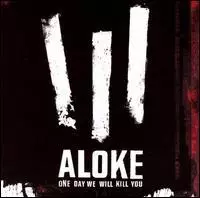For the first time I can think of, reading a press sheet actually did me some good. Kept me from looking like a complete fool, actually, as without that sheet of paper I would not have known that Aloke's One Day We Will Kill You was recorded entirely live. There's some clapping and crowd-anchored "whoo"s at the end of some of the songs, but to be quite honest I did not even notice until listening the second time through.
That says a lot for the band's cohesion and commitment to quality, though much of how good the songs come across is likely due to the type of music that the band is playing. Distortion-laden post-punk is what's to be found on this ten-song effort, complete with choppy riffing and an underlying melodic current that anchors the sound of each and every track. None of the arrangements are that difficult or outlandish, so it allows Aloke to really nail down the songs with all the vitriol you could possibly ask for.
All of that aside, this three-piece's best quality is their understanding of the dynamics of volume.
It seems like a simple enough concept, and one that every band should grasp just by the sheer will of them making a record, but it rarely works out quite that simply. Be it through the song structures themselves, the final mix, or just how it all comes across, many bands just fail at what they're trying to do. Not Aloke.
The album's longest track, "Penny Whistle" is naturally the one that covers the most ground. At five-and-a-half minutes, though it doesn't feel it, the song is able to traverse many different rises and falls just because of their understanding of the dynamics of volume. Beginning with some slow and soulful vocals atop some slow, repetitious clean riffing, the three-piece then explodes into waves of distortion and calamitous drum fills that shake the song's foundation, before returning to the more subtle verse. "California" takes the opposite route, starting out with the howling vocals of Christian Zucconi, before slowing into a bouncy but reserved rhythm that compliments the beginning better than one would expect. "Nameless" goes through numerous ups and downs, each transition just as fluid and effective as those coming before it but really bringing a different quality to the vocals at the end. The twinkle of the cords and slow strain of Zucconi gives off quite the haunting feeling, one that sets the stage well for other such moments on the record.
Usually a band's recorded output is what makes somebody want to travel and pay the money to see a band live, but Aloke are just one step ahead of the curve. Functionally, this could work well as a studio or live album, and that's something that bodes extremely well for the three-piece. Good from a press sheet, eh, who would have thought.
